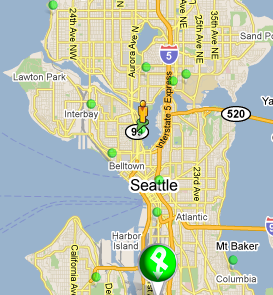With the business side of marijuana building a grey market and pot dispensaries popping up across the city, progressive Capitol Hill isn’t going to let its challenging business environment get in the way. Pike/Pine will soon join the wave of entrepreneurial marijuana industry blooming across Seattle, CHS has learned.![]()
Facilities to acquire sinsemilla have existed on Capitol Hill’s counter-culture streets for generations but rising rents, for one, have squeezed most off the Hill. Just last year, we’re told, a longtime provider to the medical marijuana scene was forced to close its facility on Broadway after losing its lease.
Philip Dawdy, media and policy director for the Washington Cannabis Association, says the “old-timer” marijuana crowd is still at work on the Hill with plans of developing a new facility on 15th Ave E but that our area is about to get a taste of the entrepreneurial generation that has been busy creating dispensaries on the city’s edges in areas like Aurora and Sodo. “What you’re going to see on Capitol Hill is the beginning of the new medical marijuana coming to the Hill,” Dawdy tells CHS.
The Capitol Hill Patient Group will be located in the east of Pike/Pine and is planned to showcase many of the attributes of the new era dispensaries: selection, convenience and safety.
“It’s arguably going to be the first on Capitol Hill,” Dawdy said. “A new dispensary in the east end of Pike/Pine is coming soon. It’s not a commercial enterprise. These are non-profit collectives.”
They also are growing like, yes, weeds. Late in 2010, The Stranger’s Dominic Holden documented the growing industry around pot in Seattle:
After years of a below-the-radar movement, medical marijuana activists are essentially daring the law to evolve to keep up with them. And more remarkable, their allies in Olympia and prosecutors in King County are trying to make these dispensaries legit.
But it was not like this even a year ago. These groups are thriving in response to more lenient federal enforcement, gray areas in state law, and an uptick in the number of legal marijuana consumers.
The Stranger has also been leading the coverage of proposals at the state level to make operating pot stores in Washington legal. But the mainstreaming of medical marijuana has moved the topic far beyond Seattle’s leading calendar rag. The Seattle Weekly has started a weekly Toke Signals (get it?) column covering the movement. This guy even left the high-flying world of hyperlocal journalism to focus full-time on a Pacific Northwest-focused marijuana magazine.
The reasons for slow growth on cutting-edge Capitol Hill are also some of the reasons other creative business endeavors struggle on the Hill. High rent and landlord concerns are the easy explanations, Dawdy says. The demographics of the Hill are also likely factors as older customers are more likely to have conditions that will qualify them for medical treatment. Younger people are also still in the habit of acquiring from the black market. And, some would say, pot faces more competition from other forms of mind-altering substances available from fine providers across Capitol Hill and nearby neighborhoods.
 Potlocator.com illustrates the void
Potlocator.com illustrates the void
But there are also more people providing services in the space emerging as legitimate businesses and organizations. 15th Ave East’s Advanced Green Therapeutics provides qualification and referral services for people seeking to smoke marijuana medicinally. The registered nurse behind Advanced Green declined to be named in this article because she doesn’t want to expose her employer to attention from the still relatively unique practice but tells us she’s not hiding. “If you call my number, I use my name. I’m just not trying to come off as a spokesperson,” she said.
UPDATE: We wanted to provide a clarification sent to us by Advanced Green:
You mentioned in the artice that I was a registered nurse, which of course I am, but I am also and advanced registered nurse practitioner (ARNP). I write recommendations as an ARNP not as an RN. RNs can not write such recommendations under their license, you must also be an ARNP.
There is stigma around medical marijuana. Pot can still get you arrested. And instances such as this dispensary hold-up in Fremont add fuel to concerns that the high-value product will attract criminal activity — though it seems like the same concerns ought to be on display regarding areapharmacies.
The nurse tells CHS she works with between 5 and 10 patients a week — most from outside the city. “I just felt like it was something I wanted to offer,” she said. “A lot of patients face judgement when they go to their provider.”
She also said there is demand for a more visible market for medical marijuana customers. “Once, they leave with their recommendation, the law prohibits me from aiding with what comes next,” she said. “They’re a bit on their own honestly. I’m hoping that the state will make it easier to get the medicine needed.”
The new dispensary wave is ready to meet that demand.
“The central core of the city has been underserved,” Dawdy said. “Everybody knows that the state law is about to change. There’s a lot of anticipation out there.”




Are there any dispensaries on the hill? I’ve heard there is one on 15th but maybe it has been closed.
For more on one of those “proposals at the state level to make operating pot stores in Washington legal” (SB 5073) see Cannabis Defense Coalition’s 2011 legislation page. For information about the current state of medical marijuana in Washington State, see our Washington State Medical Cannabis Primer and Courtroom Observation Companion.
Cannabis Defense Coalition is a 501(c)(3) nonprofit activist collective focused on marijuana policy (not specifically medical marijuana policy) in Washington State. I’m a member and was recently elected to my second term on our board of directors. Membership costs $40 per calendar year and is open to all natural persons who subscribe to our mission and vision. For a concise view of what we do, see our projects page.
I for one am so happy to see Medical Marijuana or Cannabis becoming more accesible to patients. It has been proven to have a medical bennefit and should be made availbale to those who use it under a doctors reccomendation. I am a 42 year old cancer survivor that has also fought thier way back out of a wheel chair from a car accident where I was hit by a drunk driver. I was in and out of the hospitals for the next several years and had to have 13 surgeries. I suffered many broken bones and was paralyzed for almost 4 years before walking again. I do not take any pain medication other than Cannabis as the RX pain keds were killing me. I had to take nasea medicine to be able to take the pain medications and the numerous pain medications which made me constipated. So I had to have RX laxatives. I couldn’t sleep on the pain medication and had to have sleepeing pills. Then I got kidney stones from all of the medicatations and had to be hospitalized for withdrawl when I quit taking all of these man made drugs, that all have so many side effects.
What we need are more of these locations and much much more research.
Thank You.
I guess I’m a little confused. Which hat is Phil wearing this week? Is Phil wearing his “policy director” of the Washington Cannabis Association hat, representing a group of dispensary owners, or is he being paid to represent the “old-timer marijuana crowd”? The WCA is not the “old-timer crowd” and I suspect that they may be rather upset when they discover that their money is being spent to promote the new alliance between Green Cross, Life-Vine and Compassion in Action. One can only wonder if this is some kind of effort to promote the “old crowd” over the “new crowd”…using the money from the new crowd to put themselves out of business and to pay for the staff, like Phil, to accomplish it.
Let’s just hope that Advanced Green Therapeutics is not actually using a “registered nurse” (RN) to write recommendations. That certainly wouldn’t be legal and both the nurse and the patients would be in jeopardy if that’s the case. I can understand why she wouldn’t want her name published.
Steve Sarich
Cannacare
206-407-3017
Steve, what about SB5798?
“”Health care professional,” for purposes of this chapter only,
27 means a physician licensed under chapter 18.71 RCW, a physician
28 assistant licensed under chapter 18.71A RCW, an osteopathic physician
29 licensed under chapter 18.57 RCW, an osteopathic physicians’ assistant
30 licensed under chapter 18.57A RCW, a naturopath licensed under chapter
31 18.36A RCW, or an advanced registered nurse practitioner licensed under
32 chapter 18.79 RCW.”
Or are you speaking about the distinction between an RN and an ARN/APRN?
I am a definitely an advanced registered nurse practitioner, and identified myself as such when I did the interview. I certainly sign recommendations as an ARNP, so no worries!